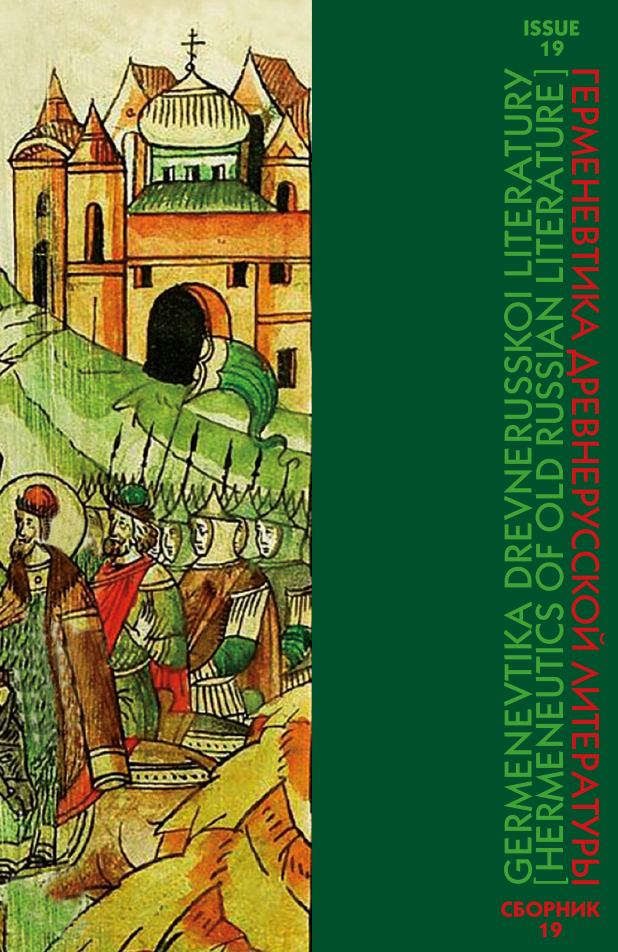Abstract:
The article examines the work Words Selected from the Holy Scriptures..., dedicated to the Novgorod campaign of Ivan III of Russia in 1471. The work has integrity, independence, contrasts stylistically with the chronicle’s material. The theme of authority, which is presented as given from above, from God, plays an important role in the Words Selected from the Holy Scriptures... Ivan III of Russia is depicted as an exemplary, ideal ruler on earth. At the same time, Marfa Boretskaya and Pimen are opposed to him as false pretenders to the authority, put forward by the Devil from hell. The text also emphasizes that Ivan III of Russia is the heir of the princes-predecessors (including Kievan Rus’), which determines his claims to the possession of Novgorod. This is aimed at justifying the justice of the Novgorod campaign of 1471 and, more broadly, the policy of the Grand Duke associated with the collection of Russian lands and the creation of a single Russian state.
REFERENCES
1 Azbelev, S.N. “Dve redaktsii novgorodskoi letopisi Dubrovskogo” [“Two Versions of the Novgorod Chronicle of Dubrovsky”]. Novgorodskii istoricheskii sbornik [Novgorod Historical Digest], issue 9. Novgorod, Oblono Publ., 1959, pp. 219–228. (In Russian)
2 Azbelev, S.N. Letopisanie Velikogo Novgoroda: Letopisi XI–XVII vekov kak pamiatniki kul’tury i kak istoricheskie istochniki [Chronicles of Veliky Novgorod: Chronicles of the 11th–17th Centuries as Cultural Monuments and as Historical Sources]. Moscow, Russkaia panorama Publ.; St. Petersburg, RBITs “Blits” Publ., 2016. 280 p. (In Russian)
3 Karavashkin, A.V. “Toposy pravednoi i zlochestivoi vlasti v “Poslanii na Ugru” Vassiana Rylo” [“Topos of the Righteous and Pious Authorities in the ‘Message to the Ugra’ by Vassian Rylo”]. Literatura Drevnei Rusi [Old Russian Literature]. Moscow, Prometei Publ., 2011, pp. 58–73. (In Russian)
4 Lur’e, Ia.S. Dve istorii Rusi XV veka: Rannie i pozdnie, nezavisimye i ofitsial’nye letopisi ob obrazovanii Moskovskogo gosudarstva [Two Stories of Russia of the 15th Century: Early and Late, Independent and Official Chronicles about the Formation of the Muscovite State]. St. Petersburg, Dmitrii Bulanin Publ., 1994. 240 p. (In Russian)
5 Nasonov, A.N. Istoriia russkogo letopisaniia XI – nachala XVIII veka: Ocherki i issledovaniia History of the Russian Chronicle of the 11th – Beginning of the 18th Century: Essays and Research]. Moscow, Nauka Publ., 1969. 556 p. (In Russian)
6 Prokof ’ev, N.I. “O mirovozzrenii russkogo srednevekov’ia i sisteme zhanrov russkoi literatury XI–XVI vv.” [“Russian Medieval Worldview and the System of Genres of Russian Literature of the 11th–16th Centuries”]. Literatura Drevnei Rusi [Old Russian Literature], issue 1. Moscow, Moskovskii gosudarstvennyi pedagogicheskii institut imeni V.I. Lenina Publ., 1975, pp. 5–37. (In Russian)
7 Ranchin, A.M. “Kievskaia Rus’ v russkoi istoriosofii XIV–XVII vv. (nekotorye nabliudeniia)” [“Kievan Rus’ in Russian Historiosophy of the 14th–17th Centuries (Some Observations)”]. Ranchin, A.M. Vertograd Zlatoslovnyi: Drevnerusskaia knizhnost’ v interpretatsiiakh, razborakh i kommentariiakh [Vertograd Zlatoslovny: Old Russian Bookishness in Interpretations, Analyses and Comments]. Moscow, Novoe literaturnoe obozrenie Publ., 2007, pp. 221–232. (In Russian)
8 Trofimova, N.V. Poetika i evoliutsiia zhanra drevnerusskoi voinskoi povesti [Poetics and Evolution of the Genre of Old Russian Military Story: DSc Dissertation]. Moscow, 2002. 451 p. (In Russian)
9 Chireikina, O.Iu. Povesti o prisoedinenii Novgoroda k Moskve v letopisiakh XV–XVII vv. i literaturnykh sbornikakh [Stories on the Annexation of Novgorod to Moscow in the Chronicles of the 15th–16th Centuries and Literary Collections: PhD Dissertation]. Barnaul, 2001. 215 p. (In Russian)
10 Shibaev, M.A. Sofiiskaia I letopis’ Mladshei redaktsii [The Sofia First Chronicle Later Redaction: PhD THesis, Summary]. St. Petersburg, 2000. 20 p. (In Russian)
11 Shmid, V. Narratologiia [Narratology]. Moscow, Iazyki slavianskoi kul’tury Publ., 2003. 312 p. (In Russian)






